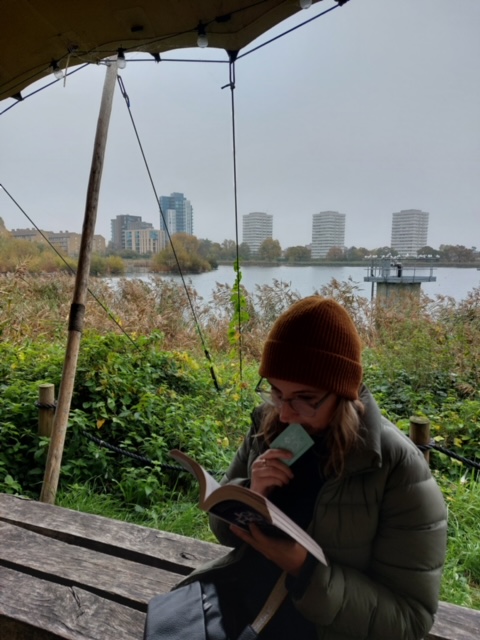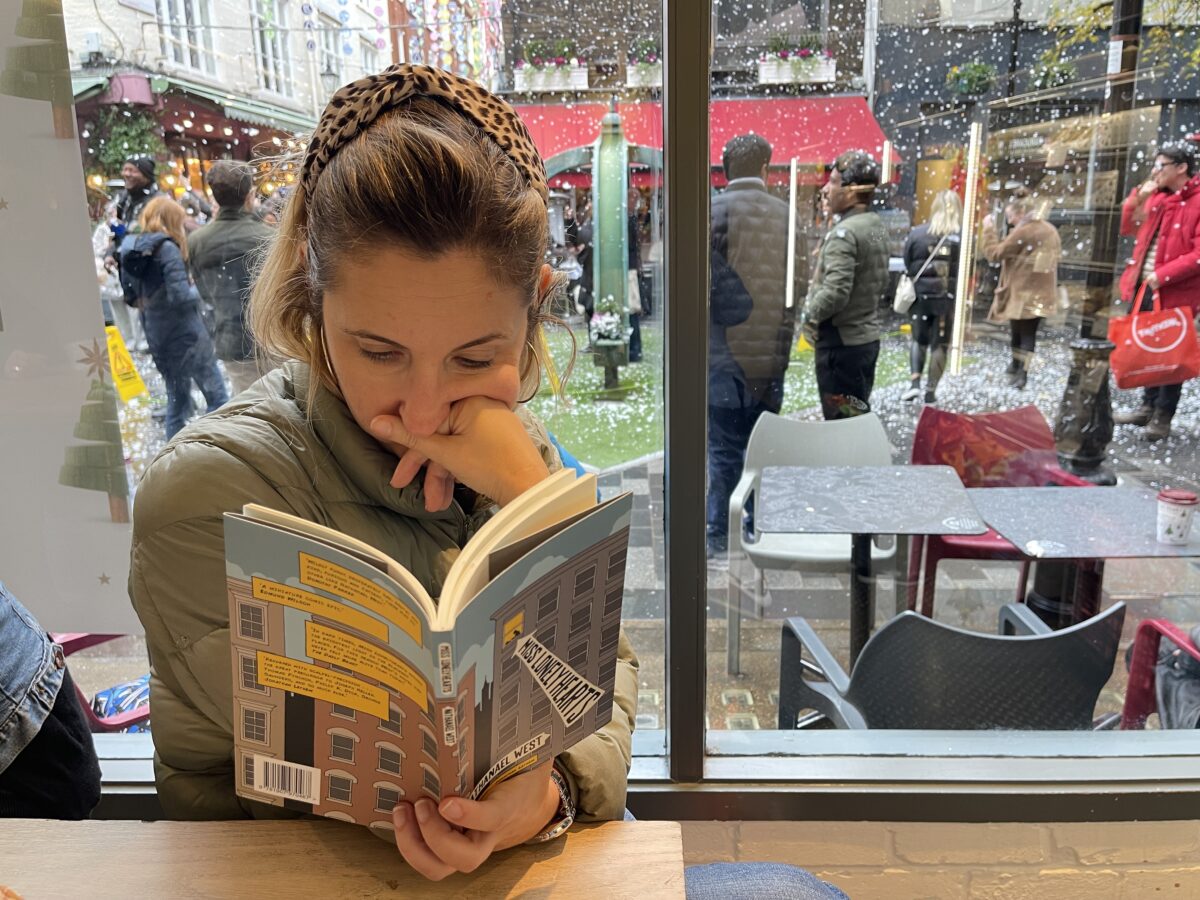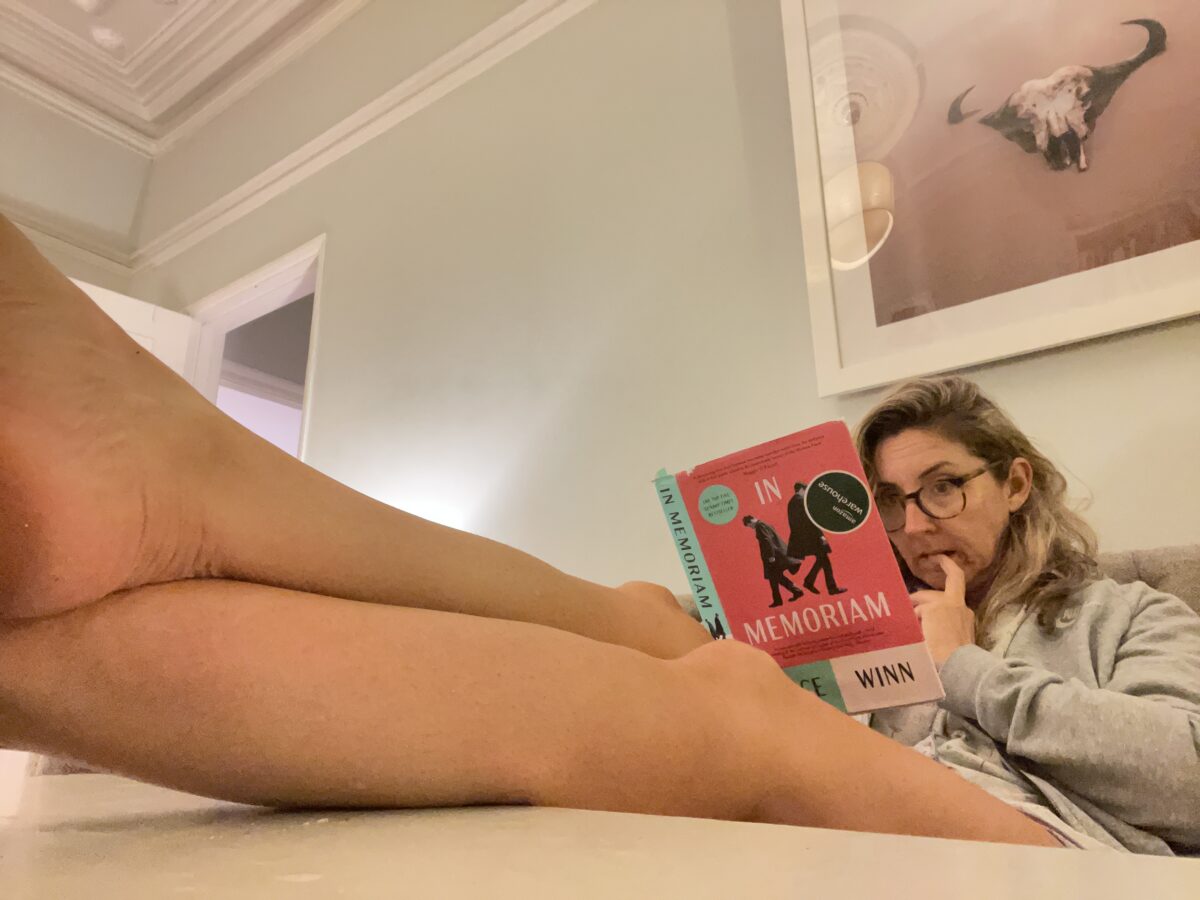I had Covid (second time round) and felt dreadful, so decided to read this fun romcom recommended to me by Instagram. I’ve never read anything quite like it before. I think it is what is called commercial fiction, and I am ready for MORE. It was a sort of classic friends-to-lovers story, and it was a towering achievement of EDITING. There was nothing in it that was not fun, funny, or moving the plot forward. The time flew by. TOLSTOY TAKE NOTE. It is not easy to cut a story down to only the parts you want to read. Now to be fair, I cannot any more recall much about what it was about, or the characters, or anything, but it passed the time most delightfully
Tag: fiction
ANGEL by Elizabeth Taylor
This book tells about a teenage girl who becomes a writer. I have read an awful lot of books that could be described as being that, as obviously: writers write what they know. This though is something different. The girl is a horrifying, self-absorbed anti-hero, or, in summary, #goals. Here she is on getting married: ” . . . she had thought of love with bleak distaste. She wanted to dominate the world, not one person.”
We follow her through a life of bestsellers and terrifying selfishness. It’s eerie and frightening. Elizabeth Taylor is just a fantastic writer. Her MRS PALFREY AT THE CLAREMONT was one of my favourite novels of last year, and while I did not like this one as much it is still objectively better than most things I read this year. Let me end by giving you this flavour, of her on a car ride:
She would have liked to drive on for ever, peacefully, jolting along in the warm air until it grew dark. The great brass lamps would be lit, drawing pale moths out of the blackness, bringing one tree forward after another, shining on closed flowers, on owls sitting on posts and cats’ eyes among the tall grasses.
MISS LONELYHEARTS by Nathaniel West
Many reviewers call this book ‘comic.’ What is wrong with these people? I found it almost unmanageably bleak. Written in the 1930s, it tells about a man who has a job replying to agony aunt letters in the newspaper. This would be rough at any time, but can you imagine the kinds of problems that you are getting written about in the 1930s? It’s mostly women, and it is hair-raising stuff: abuse, unwanted pregnancies, and etc. The man is busy having a religious crisis and is in no state to handle this kind of content. Almost worse than the letters are his friends at the bar, who joke about women in ways that I can only hope are exaggerated and not a real reflection of men a hundred years ago.
I did find this interesting, a description of some of his writer colleagues: “At College, and perhaps for a year afterwards, they had believed in literature, had believed in Beauty and in personal expression as an absolute end. When they lost this belief, they lost everything. Money and fame meant nothing to them. They were not worldly men.”
I found that an interesting idea, that some people are worldly and some are not.
BUDDENBROOKS by Thomas Mann
This major German classic was the first novel of Thomas Mann (at just 26!) Like many first books it is based on his own life, and let me tell you, he is coming out with all sorts, working through the issues, and etc. It covers three generations of a family, who start off as wealthy merchants and end up SPOILER ALERT kind of poor and certainly bitter.
It is an incredible feat of creation, with an extraordinary number of characters, swiftly created. Try this old lady, who only appears for a half page:
. . . a little wrinkled creature, rich in the grace of God and knitting patterns, who lived in the Holy Ghost Hospital and was named Himmelsburger. She was the last of her name – “the last Himmelsburger,” she called herself humbly, and ran her knitting-needle under her cap to scratch her head
Sometimes it does get a bit carried away, with one long section being a single day in the life of one small boy who has not done his homework. I learn from Wikipedia that this has sometimes been translated as a separate work, and Mann considered it as such. Am not too clear why then it was in this work, as it was exceedingly random, but there you go.
Sometimes though I found all that detail quite charming, as a window into nineteenth century German life. Try this, where they go to a restaurant. First of all, bizarrely, the group orders ‘one beer and six milks,’ but then the waiter asks the obvious question: “sweet milk, buttermilk, sour milk, or clotted milk?” Disgusting and fascinating.
WILLIAM’S WIFE by Gertrude Trevelyan
Here is a book about becoming a bag lady. Required reading, because we are all always at risk of bag ladydom. The story begins with a young shopgirl marrying a wealthy widower in the early 1900s. Today we’d call his behaviour coercive control. Back then I suspect they just called it marriage. For example, he is extraordinarily unwilling to give her any money. She doesn’t get anything for new clothes for twenty years, and has to steal it from the housekeeping allowance.
She starts off reasonably normal, but over time gets stranger, starting to hoarde, and feeling that ordinary neighbours are somehow intrusive. Then the husband dies, and I thought this was going to become an uplifting worm-turns type story, where she save herself. But it turns out to be a much more realistic kind of story, in which the worm keeps going the same way it always was.
Once on her own, she finds she cannot bring herself to spend the money she now has, and is increasingly paranoid. It’s so totally told from her point of view that you do not quite realize how bad it has got until right near the end. In an impressive piece of writing, the author introduces a brief interaction with a policeman, where you abruptly realize that she now seems to others to be a crazy old bag lady. It is almost a jump scare.
This book comes from a press that re-publishes forgotten books. I often find that if someone has bothered to republish a book by a woman, it often a very good book. Many more books by women have been forgotten than books by men, so the likelihood is higher I guess. This writer, Gertrude Trevelyan, was famous even as a student at Oxford for her writing, and spent all her twenties dedicatedly writing, not travelling, not nothing, before dying in the London Blitz. Seems sad she should be forgotten.
THE MOOR’S ACCOUNT by Laila Lalami
I’m apparently really feeling shipwrecks at the minute. I just finished THE WAGER, a total shipwreck shocker where a rich guy makes bad decisions. Today, and on dry land, those people usually get promoted. Back then and when the ocean is involved, outcomes are harsher. In this mind-bending novel, THE MOOR’S ACCOUNT, based on real events, a Spanish expedition lands in Florida in 1527. The genius running it, Nantes, decides it will be a good idea to send all the ships onward to a bay (that he assumes probably exists) while he leads 300 people to find a lost city of gold that he has tortured some native Americans into telling him exists. No surprises, everybody dies, and cannibalism absolutely plays a role. Only four people are ever heard from again. They turn up eight years later, having completed an incredible tens of thousands of miles to end up all the way at Mexico City.
This story is told from the perspective of one of the four, an enslaved man called Estebianco. The other three all wrote accounts of their journey, but he is only known from one line, which lists him as one of the four survivors. The novel is a really impressive feat of imagination, taking him from Morocco through enslavement and on to this truly wild journey.
I just want to say one thing that really made me LOL, and gives one more sympathy for this Nantes. You will recall (maybe) that Cortez conquered the Aztecs and became fabulously wealthy, finding so much gold that he crashed the value of gold in Spain. Apparently Nantes was supposed to have lead that expedition, but Cortez just basically got organized and left before they could make it official. Poor guy. I just love his bad temper and his feeling that he somehow deserved a city of gold. Don’t we all.
ALL THIS COULD BE DIFFERENT by Sarah Thankam Mathews
This is a book about a recession. In it, a young woman works a job she hates and is extremely grateful for. It’s a story humming with economic anxiety. This part made me laugh:
Early on he (her boss) called me his rock star. This was funny to me, since in actuality rock stars get onstage, perform, fuck many girls, wreck the hotel room. I, meanwhile, sweated competence, a hungry efficiency.
How often have I sweated competence! OFTEN. It’s curious how very few books are written about office jobs, given so many people spend so much of their lives in them. It’s like we don’t think it’s a real part of our life.
I also really like this part:
All my life, when I imagined the future, I thought of each of us as small atoms, individuated, settling down, getting a flat somewhere, wearing out one job and then another, like successive pairs of shoes. You grew up, you were found a person to marry, you went sullenly to work, you kept a house running, you did the requisite paperwork or paid the price, and then for two hours of the day you might cultivate a pastime, like yelling at sports on the television or forcing the lawn into submission. It took bravery to imagine something even slightly different, let alone follow that imagining through.
Ouch.
One piece of whining, there was a lot of weirdly specific descriptions of food. Try this:
Some people find it harder to forgive you for not actually being wrong, Tig had said in her Tig way over bowls of bisque served with ragged pieces of country loaf.
?!? ragged pieces ?!? country loaf !?!
THE PRIVILEGES by Jonathan Dee
I’m really reading intensely and fast at the minute. For unclear reasons my attention span seems to be BACK. This one was about a couple who get married and get rich the gross way, i.e., banking. I wish I could get rich the gross way. I enjoyed the early part, where they are young, but once they got their millions, I felt the book sort of turned moralistic, like it couldn’t just let rich people be happy. Like somehow it wouldn’t be right to have book about how people got really rich and that was great. I have news: I think many rich people are really happy.
AN INSTANCE OF THE FINGERPOST by Iain Pears
I am apparently well mad for the seventeenth century at the minute. Here I am with another book about the English Civil War. This one is a murder mystery. It tells the same story from four different perspectives. It’s a really fun mishmash of all kinds of ideas: Venetian travelers, cadaver acquisition, Royalist plots, Quakers, mental health problems, you name it. The part I found most striking was the fierce debate about whether experimentation was the right way to build scientific understanding. This sounds bizarre: like, obviously it is? How else are you supposed to know anything? But in the seventeenth century this was a revolutionary idea, with most people thinking it was presumptuous to question the wisdom of the ancients. It’s a bit like when I found out that people used to object (!) to handwashing. There is something so fun about finding out how constructed your worldview is.
IN MEMORIAM by Alice Winn
I started this book at 10pm, in bed, and next thing I knew it was past midnight. I hadn’t even looked up. It’s a long time since I got absorbed in a book so easily. It reminded me of childhood, when I used to often read for hours. I finished the whole thing the next day, despite being kind of busy. I chose long bus routes on purpose so I would have time to read, and it’s a long time since I enjoyed a London bus so much.
The story starts in a boys’ boarding school in England. The one boy, Gaunt, is in love with the other boy, Ellwood. It’s hard enough at the best of times to tell if someone likes you back, but it’s especially hard for Gaunt, because its 1913, and despite all the boys sleeping with each other in this place (?) it’s also profoundly homophobic. And that’s the other part: it’s 1913. Gaunt enlists when the war starts, and we go to the trenches. Ellwood follows him out there.
The book is inspired by the IN MEMORIAM section of boarding school newspapers, that used to carry reports of deaths of old boys. Before the war, this section was short, but after 1914 it became lengthy, there as large numbers of teenagers from the fanciest schools started dying. It’s sad to think, for the younger boys, waiting to turn 18, how they went from the it’ll-be-over-by-Christmas enthusiasm of 1913 to just-waiting-for-my-turn-to-die in 1917, 1918.
Reading this book gave me some hope that my phone has not permanently damaged my attention span. What I need to be doing is spending more time on finding books I might actually like, because when I do, it’s like I am nine again, the internet’s not been invented, and my mind is still my own.










